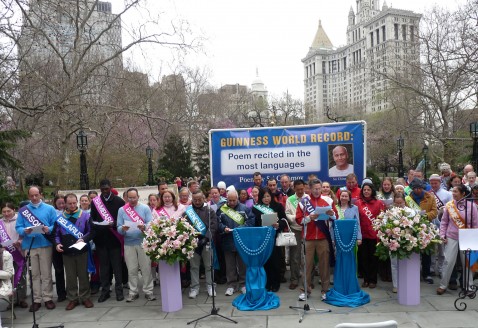 New York city residents can perhaps be forgiven if they boast or claim to have seen just about everything. When you are living in a melting pot, for just about all the world’s cultures, and in addition, you are the home of the United Nations, most New Yorkers will not be surprised much by what they see taking place in and around the city’s 5 boroughs.
New York city residents can perhaps be forgiven if they boast or claim to have seen just about everything. When you are living in a melting pot, for just about all the world’s cultures, and in addition, you are the home of the United Nations, most New Yorkers will not be surprised much by what they see taking place in and around the city’s 5 boroughs.
On April 14h, if they happened to be passing by City Hall park, even the most jaded of the city’s 8 million residents would have been justifiably surprised to see something, no one has ever seen before. In addition, to also have an opportunity to listen to a Guinness World record taking place before their eyes and their ears. A poem, written by the late Spiritual teacher Sri Chinmoy was recited by his students in 111 different languages.
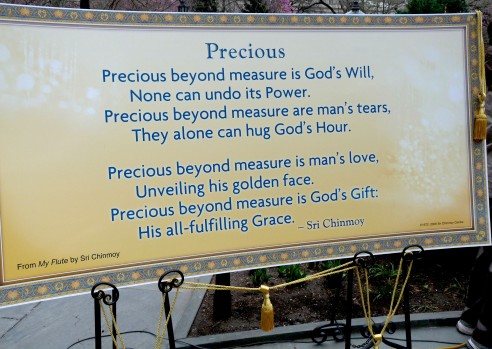 For Ashrita Furman, who organized the event, it was his 100th current Guinness record. As someone who has been breaking all manner of Guinness records for 30 years it was also unique and special. Though he has always dedicated his efforts to his teacher, in this one he had to be assisted by more than 100 of Sri Chinmoy’s students who had come to New York for the anniversary celebrations marking Sri Chinmoy’s arrival in the West in 1964.
For Ashrita Furman, who organized the event, it was his 100th current Guinness record. As someone who has been breaking all manner of Guinness records for 30 years it was also unique and special. Though he has always dedicated his efforts to his teacher, in this one he had to be assisted by more than 100 of Sri Chinmoy’s students who had come to New York for the anniversary celebrations marking Sri Chinmoy’s arrival in the West in 1964.
from My Flute by Sri Chinmoy.
 The old record for reciting a single poem in different languages was 79. Ashrita, when asked, why attempt this record, told how the poem was appropriate in particular to the philosophy of Sri Chinmoy. “We thought this would be a really great way to honor his vision of World Peace.”
The old record for reciting a single poem in different languages was 79. Ashrita, when asked, why attempt this record, told how the poem was appropriate in particular to the philosophy of Sri Chinmoy. “We thought this would be a really great way to honor his vision of World Peace.”
The poem ‘Precious‘ was chosen because he said it was one of Sri Chinmoy’s favourites and that it would be inspiring for everyone.
He said, “Sri Chinmoy really loved this poem.” Ashrita was the last speaker in the alphabetical order and recited the poem in Zulu, which he had been practicing for a few days. The demands of this record are quite different than most of his other records, in that it is not physically demanding but instead presents for him a very large organizational challenge. He is thrilled of course to be part of this project. With enthusiasm he says,”No poem in the history of the world has ever been translated and recited in more than 79 languages. We are doing something unprecedented. It is a thrill to do something that has never been done before. In this case it has a broader meaning because we really believe in the oneness of the world.”
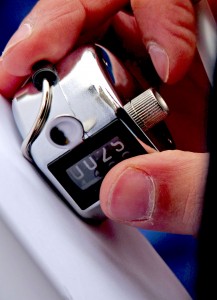
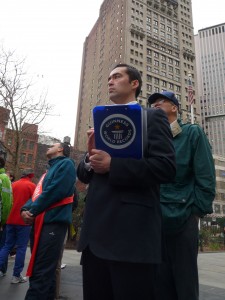 The event was of such significance that Danny Girton jr., an adjudication executive with Guinness World records was there to observe the event. He says, “Ashrita and I had discussed the details of his attempt extensively before today. Including what the languages would be, who was going to speak the languages, what the translations were and who did them, just to ensure all the background work was done. That, I noticed, is the common thread in all Guinness World Record achievements.”
The event was of such significance that Danny Girton jr., an adjudication executive with Guinness World records was there to observe the event. He says, “Ashrita and I had discussed the details of his attempt extensively before today. Including what the languages would be, who was going to speak the languages, what the translations were and who did them, just to ensure all the background work was done. That, I noticed, is the common thread in all Guinness World Record achievements.”
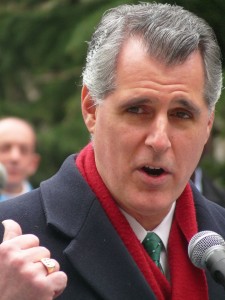 City Councilman Jim Gennaro helped to get permission for the event to take place in City Hall park. He was also the first speaker to start off, reciting the poem in English. He said, “this is the kind of event that should happen in the seat of government here right in New York city. It is the greatest city in the world.” He
City Councilman Jim Gennaro helped to get permission for the event to take place in City Hall park. He was also the first speaker to start off, reciting the poem in English. He said, “this is the kind of event that should happen in the seat of government here right in New York city. It is the greatest city in the world.” He 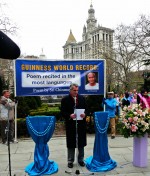 also talked about the inspiration from the event as being one of the most memorable experiences of his life.
also talked about the inspiration from the event as being one of the most memorable experiences of his life.
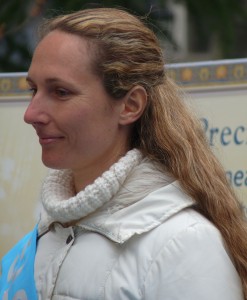
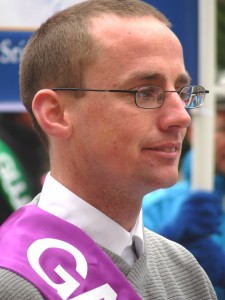 “You really inwardly have to go deep within and feel the inner feeling the inner vibration and somehow come up with words that best reflect that.” Nirbhasa Magee from Dublin Ireland (Gaelic).
“You really inwardly have to go deep within and feel the inner feeling the inner vibration and somehow come up with words that best reflect that.” Nirbhasa Magee from Dublin Ireland (Gaelic).
Prakashita Bercic (Slovenia) says, “when you say it in your own language somehow the poem gets closer to you.”
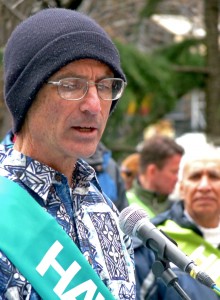
 Bangshidar Medeiros recited the poem in Hawaiian, the translation was provided by a family member. “To hear Sri Chinmoy’s poetry in that type of musical language moves me especially.” He grew up in Maui and feels the language is still deep inside of him. Bangshidhar interview
Bangshidar Medeiros recited the poem in Hawaiian, the translation was provided by a family member. “To hear Sri Chinmoy’s poetry in that type of musical language moves me especially.” He grew up in Maui and feels the language is still deep inside of him. Bangshidhar interview
Dundubhi Dikel from Switzerland performed for the entire record.
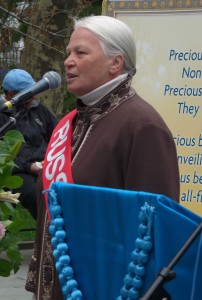
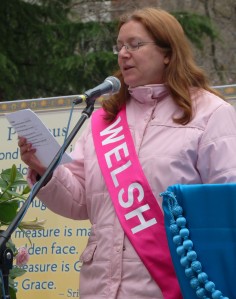 Prabhavati Evans recited the poem in Welsh. It was translated by a colleague at work who thought the poem, “was absolutely beautiful.”Prabhavati interview
Prabhavati Evans recited the poem in Welsh. It was translated by a colleague at work who thought the poem, “was absolutely beautiful.”Prabhavati interview
It is a very deep philosophical poem and so makes you think of very many very serious and deep questions. Tejomayi (Ukraine) Tejomayi interview
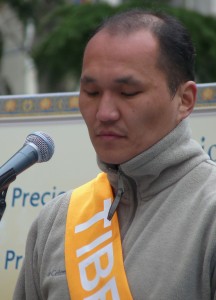
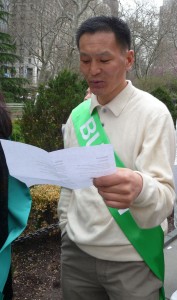 Some reciters of course recited in several languages. Deeldar Sedjav from Mongolia used both Bhutanese and Tibetan. Gombosuren Luvavsandorj, also from Mongolia represented that Country and another from the region. For Deeldar it was as he describes it, “a very sweet experience.”
Some reciters of course recited in several languages. Deeldar Sedjav from Mongolia used both Bhutanese and Tibetan. Gombosuren Luvavsandorj, also from Mongolia represented that Country and another from the region. For Deeldar it was as he describes it, “a very sweet experience.”
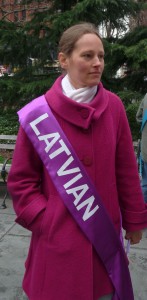
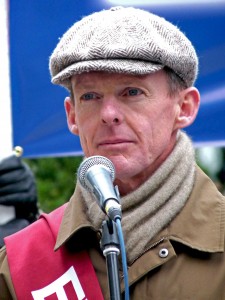 Shardul Dillicar from New Zealand recited the poem in an Aboriginal dialect from Australia. He describes that his translation was too difficult to read in the actual language and he read instead its phonetic translation. Shardul interview
Shardul Dillicar from New Zealand recited the poem in an Aboriginal dialect from Australia. He describes that his translation was too difficult to read in the actual language and he read instead its phonetic translation. Shardul interview
Valishtha Upmane from Latvia says about her work on the poem, ” the more you do something about it the more value or depth you find there.”Valishtha interview
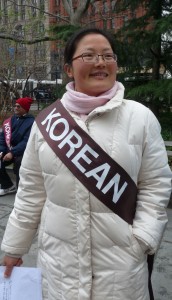
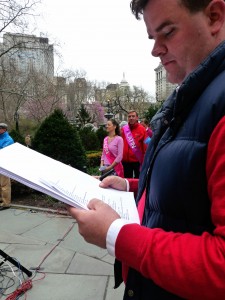 Hemabha Jang from Korea says, “Poetry is the universal language. Sri Chinmoy’s poetry has the universal feeling of it.”Hemabha interview
Hemabha Jang from Korea says, “Poetry is the universal language. Sri Chinmoy’s poetry has the universal feeling of it.”Hemabha interview
Gangane Stefansson (Iceland) keeps track of the number.
Vijay Mishra interview…no picture
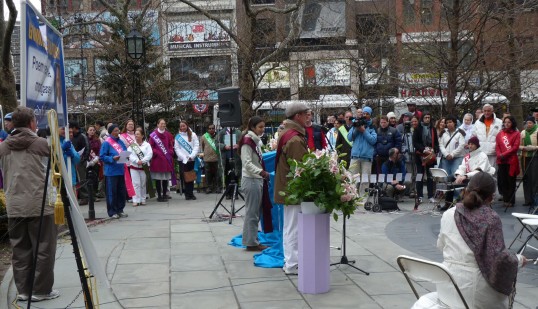 Meriem Alt Ouyahia from Algeria recited the poem in three languages. She describes how the very nature of the project required many people to participate. The translator from Togo said to her, “O wow what a beautiful poem. Thankyou so much for making me part of this project.”Meriem Alt-Ouyahia interview
Meriem Alt Ouyahia from Algeria recited the poem in three languages. She describes how the very nature of the project required many people to participate. The translator from Togo said to her, “O wow what a beautiful poem. Thankyou so much for making me part of this project.”Meriem Alt-Ouyahia interview
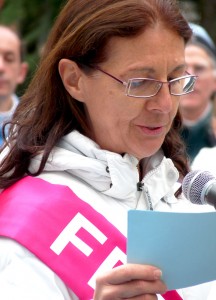
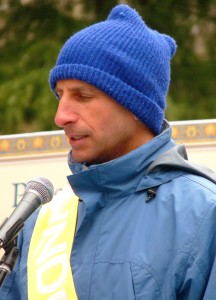 Padmasini Guillet represented France
Padmasini Guillet represented France
Aparajita Fishman represented Indonesia.”I loved the whole event there was a charm to it. Each language is an instrument in the symphony of humanity.”
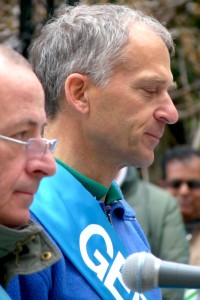
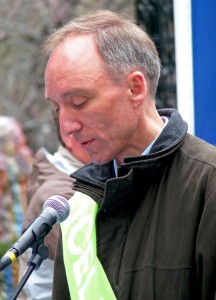 Kailash Beyer represented Germany
Kailash Beyer represented Germany
Snatak Matthiasson represented Iceland
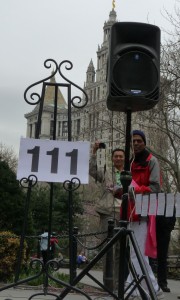
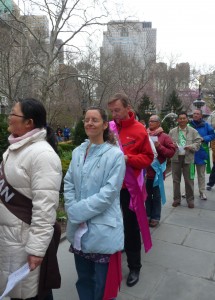 The line of reciters moves slowly along. All prepare for their brief time dealing with a language that may be second nature or may be foreign. All will have one common bond. They have recited a single poem in a group effort that was all about harmony, oneness, and expressing the eternal beauty that lies so close within us all.
The line of reciters moves slowly along. All prepare for their brief time dealing with a language that may be second nature or may be foreign. All will have one common bond. They have recited a single poem in a group effort that was all about harmony, oneness, and expressing the eternal beauty that lies so close within us all.
“What I saw today demonstrated true character, and commitment, and resourcefulness.”
Question: What is poetry?
Sri Chinmoy: I always say that man writes prose, but it is God who writes poetry in and through man. In poetry, each word carries us into the Unknowable, where there is tremendous joy. We may think that when we enter into the Unknowable, we will be totally lost. But we are not lost; we are flying.Poetry is intuitive, so we should not try to understand it. It is not the mind we need in order to derive joy, but the heart.
Excerpt from Sri Chinmoy Answers, Part 7 by Sri Chinmoy.

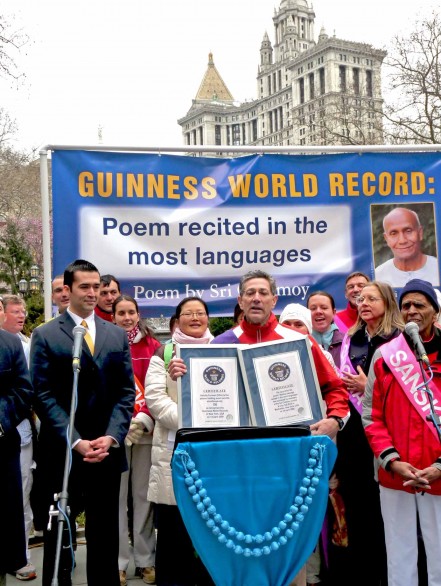
Congratulations to Ashrita and to everyone. What a wonderful dance of oneness and offering. While looking at the photos and reading about the event I felt so much joy. It was as if I was right there with all of you. It’s so wonderful to be able to download the website in China, where I live now, and feel a part of the celebrations in New York. A drop of inspiration truely does ripple ’round the world.
Kostbar über alli Mass isch de Wille vo Gott. Niemer cha sini Chraft
vernichte.
Kostbar über alli Mass sind Träne vom Mänsch. Sie allei chönt Stund vo Gott umarme.
Kostbar über alli Mass isch d’Liebi vom Mänsch, wenn sie ihres goldige Gsicht zeigt.
Kostbar über alli Mass isch d’Gschänk vo Gott, sini ales erfüllendi
Gnad.
Schwyzerdütsch
Chostbar über alli Mass isch de Wille vo Gott. Niemerd cha sini Chraft vernichte.
Chostbar über alli Mass sind Träne vom Mänsch. Sie allei chönt Stund vo Gott umarme.
Chostbar über alli Mass isch’d Liebi vom Mänsch, wenn sie ihres goldige Gsicht zeiget.
Chostbar über alli Mass isch’s Gschänk vo Gott, sini alles erüllendi Gnad.
Schwyzerdütsch neui Vassig
Amoolya Precious